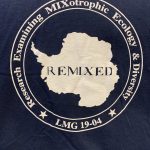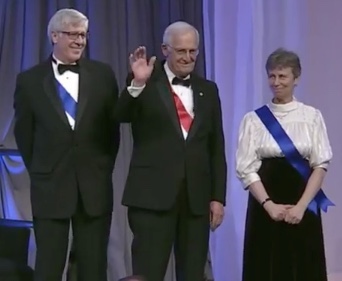As of 1 January 2025, Bob will be stepping away from Chair of the Department of Biology and begin a new role as Associate Dean of Faculty Affairs in the College of Science and Technology at Temple University.
Author Archives: Robert Sanders
Chris Carnivale Defends PhD
Link
Chris successfully defended his dissertation: “Investigations of Bacterivory and Microplastics in the Southern Ocean” on December 11, 2024. Congratulations Chris!
Jean-David teaching Genomics at TU
Link
JayDiii is teaching a mixed graduate/undergraduate course in Genomics for a faculty member who is on a stint with the National Science Foundation.
JayDiii is co-author in Bull of Math Biol
Link
A Mathematical Model of Diel Activity and Long Time Survival in Phototrophic Mixed-Species Subaerial Biofilms. Tenore, A., Russo, F., Jacob, J., Grattepanche, J.-D., Buttaro, B., Klapper, I.Bulletin of Mathematical Biology, 86(10), p.123. IF 2.0
Chia-mei (Eli) Chang defends Ph.D.
Link
Eli successfully defended her Ph.D. dissertation on March 26, 2024. Congratulations on a great presentation of an excellent body of work. Title: “Influence of abiotic environmental factors on physiological responses and mixotrophy in freshwater and marine chrysophytes.”
The Lab Attends ASLO Ocean Sciences Meeting in New Orleans
Link
Jean-David Grattepanche, Eli Chang and Bob Sanders gave presentations at The Association for the Sciences of Limnology and Oceanography annual meeting in New Orleans. February 18-23.
Eli Chang gets CST Teaching Assistant Award
Link
Recent Publications
Link
- Princiotta, S.D., A. VanKuren, C.E. Williamson, R.W. Sanders, M.S. Valiñas. 2023. Disentangling the role of light and nutrient limitation on bacterivory by mixotrophic nanoflagellates. Journal of Phycology 00:1-6, online June 2023. [doi:0.1111/jpy.13358]
- Millette, N.C., R.J. Gast, J.Y. Luo, H.V. Moeller, K. Stamieszkin, K.H. Andersen, E.F. Brownlee, N. Cohen, S. Duhamel, S. Dutkiewicz, P.M. Glibert, M.D. Johnson, S.G. Leles, A.E. Maloney, G. McManus, N. Poulton, S.D. Princiotta, R.W. Sanders and S. Wilken. 2023. Mixoplankton and mixotrophy: Future research priorities. Journal of Plankton Research. fbad020. [doi:10.1093/plankt/fbad020]
- Princiotta, S.D., Nguyen, T.** and R.W. Sanders. 2023. High abundances and negligible grazing during winter by the mixotrophic chrysophyte Dinobryon. Fottea 23:201-207. [doi: 10.5507/fot.2022.020]
- Grattepanche, J.-D., W.J. Jeffrey, R.J. Gast, R.W. Sanders. 2022. Diversity of microbial eukaryotes along the West Antarctic peninsula in austral spring. Frontiers in Microbiology 13:844856 [doi:10.3389/fmicb.2022.844856]
- Sanders, R.W. 2021. Protists: Flagellates and Amoeba. in: Earth Systems and Environmental Sciences, Reference Module. Elsevier. doi: 10.1016/B978-0-12-819166-8.00079-7
We are back from our Antarctic Marine Science Expedition. The link is to a blog and some photos.
Link
Wade Jeffrey’s exhibit of photos from Antarctica
Link
Our colleague Wade Jeffrey, a professor at Western Florida University and collaborator on our NSF Antarctic grant, has a show of wonderful photos that he has taken during his numerous trips (including several with us) in the Southern Ocean. Here’s a link.
Our second Antarctic expedition to the WAP
Link
Bob Sanders (TU), J.D. Grattepanche (TU), Nicole Millett (WHOI, now at VIMS), Wade Jeffrey (UWF) and Leila Harris (UWF) returned in December 2019 from another oceanographic expedition off the west coast of the Antarctic peninsula. This cruise on the Nathaniel B. Palmer was the second of two cruises to investigate the ecology and diversity of phagotrophic phytoplankton (mixotrophs). We consider it a success, though delays in the return of samples to the US and shutdown of out labs by the pandemic put us far behind schedule in our analyses. We were scheduled for another in April 2021, but the pandemic intervened there too, putting a halt to all US Antarctic expeditions. for the 2021 season.
Back from another Antarctic research expedition
Link
Bob Sanders was joined by Jay Diii Grattepanche and Chris Carnivale from Temple, Wade Jeffrey and Leila Harris from Western Florida University, and Nicole Millette from WHOI on an early Austral spring research cruise to the Western Antarctic Peninsula. Supported by NSF. Here’s a link to a few photos: Antarctica Oct to Dec 2019. Our cruise designation was “Mixotrophic Eukaryotes in Antarctica: Their Habitat, Environmental Adaptation & Diversity (MEATHEAD)”
Sanders, Gast, Jeffrey REMIXED Research Teams return from Antarctica
Link

J.D. Grattepanche (TU), Becky Gast (WHOI), Wade Jeffrey (UWF) and Ari Simmering (UWF) have recently returned from an oceanographic voyage off the west coast of the Antarctic peninsula. This cruise on the Laurence M. Gould was the first of two cruises to investigate the ecology and diversity of phagotrophic phytoplankton (mixotrophs). Check out the cruise through Becky’s blog – it’s on the right-hand column of her website: https://www2.whoi.edu/staff/rgast/
Gene Likens, Franklin Medalist for Earth and Environmental Science
Link
Bob Sanders and Laura Toran (Temple University Earth & Environmental Sciences) co-sponsored Gene Likens’ recent award of the Franklin Medal in Earth & Environmental Science. Here’s a link to the Franklin Institute’s page of the honorees and award ceremony for 2019.
(Bob Sanders, Gene Likens, Laura Toran)
Mixotrophy papers, including Gast, Fay & Sanders 2018 compiled as e-book
Link
Gast, R.J., S.A. Fay and R.W. Sanders. 2018. Mixotrophic activity and diversity of Antarctic marine protists in austral summer. Frontiers in Marine Science 5:13 is available with all of the papers in that special edition as an e-book available at the link here.
New multi-author paper on biogeography of oceanic constitutive mixotrophs
Link
Bob Sanders participated in writing a paper on the biogeography of protists that have an innate ability to photosynthesize, but also are phagotrophic.
Leles, S.G., A. Mitra, K.J. Flynn, U. Tillmann, D. Stoecker, H.J. Jeong, J. Burkholder, P.J. Hansen, D.A. Caron, P.M. Glibert, G. Hallegraeff, J. Raven, R.W. Sanders, M. Zubkov. 2019. Sampling bias misrepresents the biogeographic significance of constitutive mixotrophs across global oceans. Global Ecology and Biogeography 28:418-428. [doi: 10.1111/geb.12853]
J.D. Grattepanche joins lab as Research Asst. Professor
Link
Jean-David Grattepanche, a broadly-experienced protistologist, has joined the lab to work on our recently funded NSF grant that includes new research curises to Antarctica. J.D. has combined the power of bioinformatics, ecology and evolution to study eukaryotic microbes, with a focus on the “SAR” clade (Stramenopila, Alveolata and Rhizaria; (Grattepanche, et al. 2018) in marine and freshwater settings. He moves to Philadelphia from the Smith College lab of Laura Katz.
Andrew wins Outstanding TA Award
Link
Congratulations to Andrew Van Kuren for winning a 2018 College of Science and Technology Outstanding TA award.
New Mixotrophy paper – McKie-Krisberg et al.
Link
A new paper, by Zaid McKie-Krisberg, Bob. Sanders and Becky Gast, has been accepted in Frontiers of Marine Science. Evaluation of mixotrophy-associated gene expression in two species of polar marine algae. [doi: 10.3389/fmars.2018.00273] .
Mixotrophy paper in “Frontiers in Marine Science”
Link
Gast, R.J., S.A. Fay and R.W. Sanders. 2018. Mixotrophic activity and diversity of Antarctic marine protists in in austral summer. Frontiers in Marine Science 5: 1-12. https://doi.org/10.3389/fmars.2018.00013